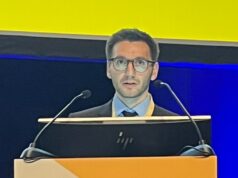
Biosense Webster has announced an update and late-breaking data from trials across radiofrequency ablation (RFA) and pulsed field ablation (PFA) at the 2023 AF Symposium (2–4 February, Boston, USA).
An analysis of the inspIRE-sponsored clinical trial evaluating the safety and efficacy of the investigational Varipulse device catheter and Tripulse generator was presented, focused on the treatment of symptomatic drug refractory paroxysmal atrial fibrillation (AF).
The researchers conveyed that PFA represents a new approach to treating AF, utilising a controlled electric field to ablate cardiac tissue through a process called irreversible electroporation (IRE). As the energy does not rely on thermal effects to ablate target cardiac tissue, IRE offers the potential to reduce the risk of oesophageal, pulmonary vein and phrenic nerve injury.
The prospective, multicentre, non-randomised study was conducted in Europe across 13 centres. The authors exacted their research as the “first clinical study for the PFA system with full electroanatomical mapping system integration”, enrolling 226 patients (wave I-40, wave II-186).
They reported that there were no oesophageal thermal lesions, pulmonary vein stenosis, or coronary spasm assessed in wave one cohort. In wave two, an independent data monitoring committee declared early success after 186-patient enrolment and 60 patients completing 12-month follow-up. Additionally, they note no primary adverse events were reported. With 100% entrance block, pulmonary vein isolation (PVI) without acute reconnection was achieved in 97.1% of targeted veins. Primary efficacy was achieved in 70.9%, 12-month freedom from symptomatic AF/atrial flutter/atrial tachycardia recurrence and repeat ablation was 78.9% and 92.3%, respectively.
“The inspIRE study achieved early success at the prespecified interim analysis, meeting both primary safety and efficacy endpoints, achieving an important milestone in the development of the novel, mapping-integrated, variable-loop, pulsed field ablation catheter,” said Vivek Y Reddy (Mount Sinai Hospital, New York, USA), co-investigator of the study.
In addition to the inspIRE clinical trial in Europe, Biosense Webster is conducting the admIRE clinical study in the USA to evaluate the safety and effectiveness of its investigational PFA system.
“PFA is the next frontier in AF treatment and may have a variety of benefits, including a better safety profile than RF ablation, without sacrificing long-term effectiveness,” noted Anthony Hong, vice president at Biosense Webster. “[We are] working to bring a versatile portfolio of PFA solutions —complementary to our RF ablation catheter portfolio—to address various ablation strategies in the treatment of AF.”
In a second late-breaker presentation, the researchers highlighted results from the STELLAR study–a US Food and Drug Administration (FDA)-regulated investigational device exemption study conducted in the USA, China and Italy, to assess the safety and efficacy of PVI using the HELIOSTAR balloon ablation catheter in drug refractory symptomatic paroxysmal AF.
Asserting theirs to be the “largest clinical study to date” with 12-month follow-up data, their analysis shows acute PVI was achieved in 98.8% of subjects, and in 93% without additional use of focal catheters. The majority of PVIs were achieved without needing focal touch-up. Primary effectiveness at 12 months was 67.7% and >90% of patients were free from repeat ablation at 12 months. In addition, the rate of clinical success—defined in the study as freedom from 12-month symptomatic atrial arrhythmia recurrence—was 77.7%.
“With the growing prevalence of AF, it is important that innovative tools are evaluated in various markets and patient populations to deliver value to patients across regions,” said Sandeep Goyal (Piedmont Atlanta Hospital, Atlanta, USA) who served as an investigator in the STELLAR study. “The results of this study provide further evidence of how RF balloon catheters can be an important tool for electrophysiologists when treating AF.”
The study researchers state HELIOSTAR balloon ablation catheter is the first radiofrequency balloon ablation catheter approved in Europe, the Middle East, and Africa (EMEA) for cardiac ablation.









